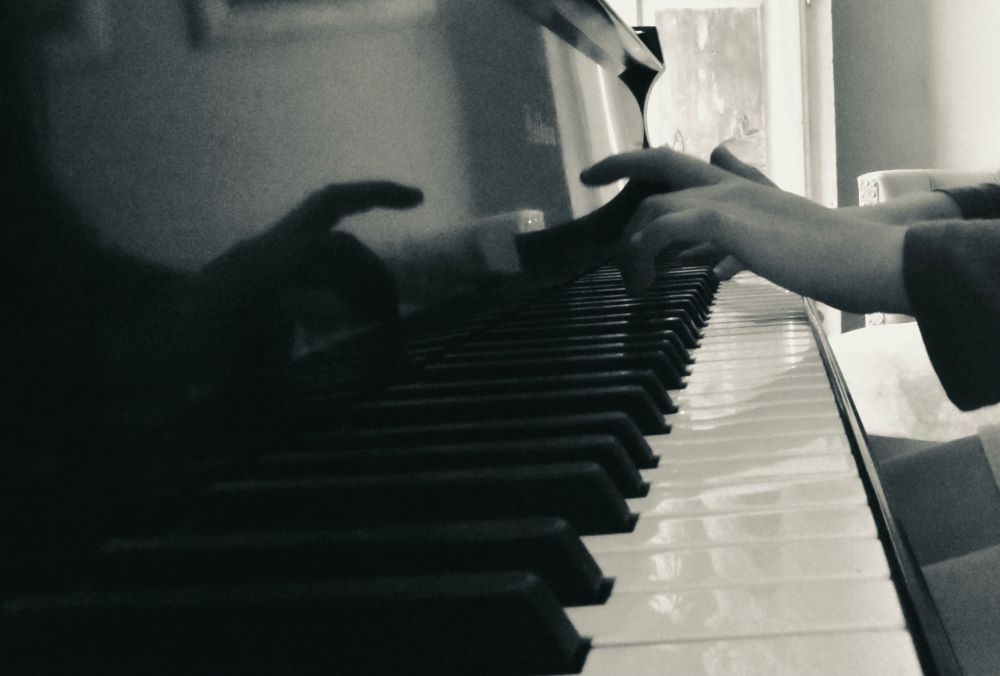
In Anne Porter's poem "Music," she recalls weeping as a child while her mother played the piano. Music at its most beautiful opens a wound in us, an ache of desolation, of homesickness, she wrote. (Unsplash/Sophia Kunkel)
In the contemporary world, religious poetry is often dismissed as didactic or pietistic. But religious poetry in its themes and art is deeply allied to spirituality: Poetry's focus on meaning, suffering, life, death, love and nature allies it with the themes of religion. Poetry requires one to slow down, pay attention, encounter the real meaning of things; in that sense it is like religious ritual. A universal and the purview of ancient priests, poetry, like song, evokes emotion. It is a form of enchantment that can transform. Poetry does not provide answers, but it stimulates questions that awaken. Poetry may be the contemporary remedy for what ails us.
There are few contemporary poets who can effectively do for us what religion does — that is, bring solace, give courage, connect us to all that is, overcome loneliness and a sense of meaninglessness. Poetry evokes a stage prior to religion. As Anglican writer Evelyn Underhill said: Poetry is the royal banner that goes before prayer.
One little-known poet had this gift. Possessing an incarnational imagination, she knew both suffering and love, the two wellsprings that bring one to awe and mystery, and prompt reaching out in compassion.
Anne Channing Porter was born in 1911 to a non-Christian family of means and reputation. Her two loves were poetry and nature. She dropped out of college and considered herself a misfit; when she married painter Fairfield Porter, they were connected to the bohemian world of the New York poets and painters in the 1950s and 1960s. Although she wrote poetry her whole life, she published only a few poems. She was a mother of five, including a son with a disability. She was hostess to the many who visited and ate at their table. Guests of the Porters might stay for weeks, but sometimes years.
Advertisement
The Porters' marriage was a stormy one; through it all, Anne wrote poetry in private, never seeking publication. In 1954, at age 43, Anne converted to Catholicism, influenced by the likes of Franciscan priests, Dorothy Day, Julian of Norwich, Francis of Assisi, Abbe Huvelin and later Teilhard de Chardin. The Porters' friends were atheists, Marxists and Freudians who could not understand her conversion. They must have only grown more perplexed when, a few years later, she became a Third Order Franciscan.
When Fairfield unexpectedly died in 1975, Anne Porter was 65, and only after that did she begin to publish her poems. She continued to do so until her death in 2011 at almost 100 years old.
Porter was a late-blooming poet. At age 83 she published An Altogether Different Language, a 1994 National Book Award finalist, and in 2006 her poems were published in In Another Word. Living Things: Collected Poems of Anne Porter was published in 2006.
The starting point to Porter's writing was her belief that the kingdom of God is within and without, in every person and in all creation. She wrote of the personal and global suffering of the innocents and the elderly. She pled to Mary, the "flowering / of our human beauty," for in her heart "the lost / Rejected and abandoned ones / Are held in honor." One of her most powerful poems, "A Song of Fear and Fire," is about the afterlife, when she would become a "tiny flake of ash" and will be "tossed / Into a fearful nothingness s/ Beyond the stars / whirling / Until my fire goes out / … I still will praise you."
One of Porter's most luminous poems is "Music," in which she recalls weeping as a child while her mother played the piano. Music at its most beautiful opens a wound in us, an ache of desolation, of homesickness, she wrote, "But we were made for Paradise":
And when music comes to us
With its heavenly beauty
It brings us desolation
We half remember
That lost native country ...
And shining at the heart of it
Is the longed-for beauty
Of the One who waits for us
Who will always wait for us
In those radiant meadowsYet also came to live with us
And wanders where we wander.
If she knew the beauty of music and nature, she also knew suffering. Her son, Johnny, had an undiagnosed disease and died young. He was a punster, a misfit, who whooped and growled with wild ecstatic joy. He was not afraid of dying, just of getting hurt: "So Johnny, now you're one of the greatest, / Because here on earth you were certainly one of the least."
Porter was attuned to suffering in her own family and globally as well. She was alive to her sins of commission and omission. In "A Short Testament" she writes:
Whatever harm I may have done
In all my life in all your wide creation
If I cannot repair it
I beg you to repair it …And where there are lives I may have withered around me,
Or lives of strangers far or near
That I've destroyed in blind complicity,
And if I cannot find them
Or have no way to serve them,Remember them. I beg you to remember them.
Anne Porter's poetry is testimony to her rich interior life. She learned from nature to pay attention and to be receptive. In nature she heard the "altogether different language" of praise. Her humility and suffering were the source of her compassion; this luminous poetry was what poured out.




